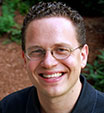Robert Bellin, associate professor of biology at Holy Cross, is currently researching the causes of neurofibromatosis type-2 in a laboratory setting with his junior and senior students, a project he refers to as “a team effort.”
Bellin became interested in neurofibromatosis during a post-doctoral position at Boston Children’s Hospital after earning his Ph.D. in biochemistry from Iowa State University. He has conducted research on the disorder for 14 years.
Neurofibromatosis, also known as NF, refers to a broad range of inherited gene diseases that cause tumorous growths in different regions of the body. NF affects approximately 150,000 people worldwide.
Bellin’s research focuses specifically on NF Type-2 (NF-2), a form of the disease which causes non-malignant brain tumors that impair audio-visual perception. His studies focus on a protein within NF-2 cells called “merlin.” The exact nature of this gene is not entirely understood, but mutations of it are what seem to result in NF-2.
This is not Bellin’s only research project. In fact, he’s working on five more. With so many plates spinning in the air, he relies on his junior and senior students to carry some of the load. Much of the work into NF-2, “is done by my upper-level biology students,” he says. “They’ve been the ones who have often made some of the most significant developments.” The three most recent students to work with Bellin on the NF-2 project are Cat Flynn '12, Mary Zabinski '13 and, currently, Roy Gildersleeve '14, all biology majors.
Flynn was involved in creating mutant forms of the merlin protein that match those in the human NF2 patient database, Zabinski tested those proteins by cell culture and confocal microscopy, and Gildersleeve is using those mutant forms of merlin to generate permanent cell-based models of NF2 in cell culture, which future students in the lab will use for continued studies.
With the support of a scientific grant from the school to fund their research, Bellin and his team have advanced their research for many years in a row, and are looking to sustain that momentum. While Bellin says that he’s, “not likely to find a cure or new treatment,” he hopes his team is able to make valuable contributions to the scientific community’s ongoing NF-2 research efforts.
Related Information
For Biology Professor, Cutting Edge Research 'A Team Effort'
Read Time
2 Minutes
